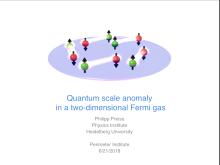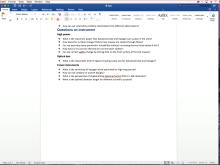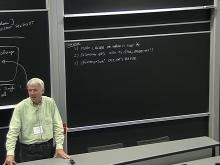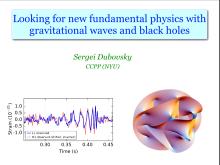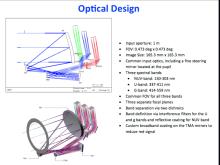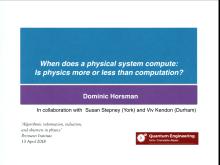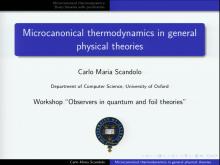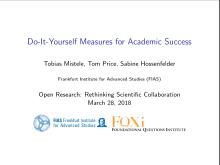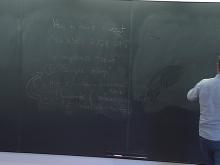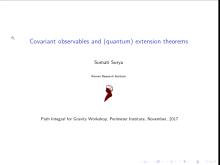Format results
-
16 talks-Collection NumberC18013
Talk
-

Emergent Gravity From Relatively Local Hamiltonians
Sung-Sik Lee McMaster University
-

Strange Metals From Local Quantum Chaos
John McGreevy University of California, San Diego
PIRSA:18060028 -

-

-

Holographic Solids: Transverse Phonons and Elastic Response
Lasma Alberte International School for Advanced Studies
PIRSA:18060031 -

Particle Physics Beyond Colliders
Asimina Arvanitaki Perimeter Institute for Theoretical Physics
PIRSA:18060032 -

-

-
-
Path to Kilohertz Gravitational-Wave Astronomy
17 talks-Collection NumberC18014Talk
-

-

Hitting the High Notes: The High Frequency Dynamics of Neutron Star Mergers
William East Perimeter Institute for Theoretical Physics
PIRSA:18060045 -

Post-Merger Gravitational Wave Emission
Andreas Bauswein Max Planck Institute for Astrophysics (MPA), Garching
PIRSA:18060046 -

Searching for Ultralight Particles with Gravitational Waves
Masha Baryakhtar University of Washington
PIRSA:18060047 -

3G Detectors, Voyager
Rana Adhikari California Institute of Technology (Caltech) - Division of Physics Mathematics & Astronomy
PIRSA:18060048 -

Discussion Session
PIRSA:18060049 -

Gravitational Wave Telescopes: Some Cosmological Considerations
Latham Boyle University of Edinburgh
PIRSA:18060050 -

Astrophysics and Cosmology with Gravitational-Wave Population Inference
Eric Thrane Monash University - Department of Physics
PIRSA:18060051
-
-
Asymptotic Safety in a Dark Universe
17 talks-Collection NumberC18012Talk
-

Charting Fundamental Interactions
Francesco Sannino CP3-Origins
-

Asymptotic safety with and without supersymmetry
Daniel Litim University of Sussex
-

-

Progress in constructing an Asymptotically safe Standard Model
Steven Abel Durham University
-

Cosmological non-Constant Problem
Niayesh Afshordi University of Waterloo
-

-

UV-complete relativistic field theories and softened gravity
Alberto Salvio Scuola Normale Superiore di Pisa
-

Asymptotic safety of gravity-matter systems and effective universality
Manuel Reichert University of Southern Denmark
-
-
Career Trajectories Day
2 talks-Collection NumberC18009Talk
-
Searching for New Particles with Black Hole Superradiance
11 talks-Collection NumberC18010Talk
-

Searching for Light Bosons with Black Hole Superradiance
Savas Dimopoulos Perimeter Institute for Theoretical Physics
-

Superradiant instabilities and rotating black holes
Sam Dolan University of Southampton
PIRSA:18050028 -

Superradiant instabilities and rotating black holes
Avery Broderick University of Waterloo
-

Measuring Stellar-Mass Black Hole Spins via X-ray Spectroscopy
James Steiner Massachusetts Institute of Technology (MIT)
-

Superradiance Beyond the Linear Regime
Frans Pretorius Princeton University
-

Characterization of compact objects with present and future ground-based gravitational-wave detectors
Salvatore Vitale Massachusetts Institute of Technology (MIT)
-

LIGO and Virgo continuous wave searches - Overview and all-sky searches
keith Riles University of Michigan–Ann Arbor
-

Directed and targeted searches for continuous gravitational waves
Sylvia Zhu Albert Einstein Institute
-
-
PI-NRC Meeting
11 talks-Collection NumberC18011Talk
-

-

Attosecond Quantum Spectroscopy Measurement
David Villeneuve National Research Council Canada (NRC)
-

Efficient Preparation of Nontrivial Quantum States
Timothy Hsieh Perimeter Institute for Theoretical Physics
-

Time And Gravity Measurement
Pierre Dube National Research Council Canada (NRC)
-

-

Canadian Astronomy Data Center: Tools and Analytics for Large Data Sets
Sebastien Fabbro National Research Council Canada (NRC)
-

-

SI Unit Fundamental Measurements
-
Angela Gamouras National Research Council Canada (NRC)
-
Barry Wood National Research Council Canada (NRC)
PIRSA:18050045 -
-
-
Algorithmic Information, Induction and Observers in Physics
17 talks-Collection NumberC18007Talk
-

-

Quantum speedup in testing causal hypotheses
Giulio Chiribella University of Hong Kong (HKU)
-

The Logic of Physical Law
Stefan Wolf Università della Svizzera italiana
-

-

On the concepts of universality in physics and computer science
Gemma De Las Cuevas Universität Innsbruck
-

A no-go theorem for observer-independent facts
Časlav Brukner Institute for Quantum Optics and Quantum Information (IQOQI) - Vienna
-

-

Algorithmic information theory: a critical perspective
Tom Sterkenburg Ludwig-Maximilians-Universität München (LMU)
-
-
Observers in Quantum and Foil Theories
11 talks-Collection NumberC18006Talk
-

Wavefunction branches as a foundation for constructing foil theories
Jess Riedel NTT Research
PIRSA:18040082 -

Compatibility of implicit and explicit observers in quantum theory and beyond
Thomas Galley Institute for Quantum Optics and Quantum Information (IQOQI) - Vienna
PIRSA:18040084 -

From observers to physics via algorithmic information theory I
Markus Müller Institute for Quantum Optics and Quantum Information (IQOQI) - Vienna
PIRSA:18040078 -

From observers to physics via algorithmic information theory II
Markus Müller Institute for Quantum Optics and Quantum Information (IQOQI) - Vienna
PIRSA:18040080 -

Motility of the internal-external cut as a foundational principle
Robert Spekkens Perimeter Institute for Theoretical Physics
PIRSA:18040073 -

-

Quantum theory cannot consistently describe the use of itself
Renato Renner ETH Zurich
PIRSA:18040085 -

-
-
Open Research: Rethinking Scientific Collaboration
11 talks-Collection NumberC18005Talk
-

-

Data Mists, Blockchain Republics, and the Moon Shot
Simon DeDeo Indiana University
-

Like penguins on an ice floe: The scary business of adopting open science practices
Benedikt Fecher Alexander von Humboldt-Stiftung
-

Collaborative Knowledge Ratchets and Fermat's Library
-
Jess Riedel NTT Research
-
Luis Batalha Fermat's Library
PIRSA:18030101 -
-

-

What’s not to like? Open science will fail unless it takes the costs seriously
Rosie Redfield University of British Columbia
-

-

-
-
Gauge Theory, Geometric Langlands and Vertex Operator Algebras
11 talks-Collection NumberC18004Talk
-

Gauge Theory, Geometric Langlands, and All That
Edward Witten Institute for Advanced Study (IAS) - School of Natural Sciences (SNS)
-

Overview of the global Langlands correspondence
Dima Arinkin University of Wisconsin-Milwaukee
-

Gauge theory, vertex algebras and quantum Geometric Langland dualities
Davide Gaiotto Perimeter Institute for Theoretical Physics
-

-

Introduction to local geometric Langlands
Sam Raskin The University of Texas at Austin
-

-

-

-
-
The Path Integral for Gravity
18 talks-Collection NumberC17057Talk
-

Welcome and Opening Remarks
Neil Turok University of Edinburgh
-

The significance of the proper time in the quantum mechanics of the gravitational field.
Claudio Bunster Centro de Estudios Científicos (CECs)
-

TBA
Viatcheslav Mukhanov Ludwig-Maximilians-Universität München (LMU)
-

Semi-classical evaluation of the 3D gravity path integral and quasi-local holography
Bianca Dittrich Perimeter Institute for Theoretical Physics
-

-

An asymptotically safe point of view on the gravitational path integral
Astrid Eichhorn Universität Heidelberg
-

The path integral for gravity and Fedosov quantization
Stefan Hollands Universität Leipzig
-

Surprises in the Path Integral for Gravity
Neil Turok University of Edinburgh
-
-
Quantum Black Holes in the Sky?
34 talks-Collection NumberC17055Talk
-

Quantifying the evidence for black holes with GW and EM probes
Paolo Pani Instituto Superior Tecnico - Departamento de Física
-

Echoes from the Abyss: Tentative Evidence for Planck-Scale Structure at Black Hole Horizons
Jahed Abedi University of Stavanger (UiS)
-

Improvements on the methods for searching echoes
Julian Westerweck Albert Einstein Institute
-

A model-independent search for gravitational-wave echoes
Archisman Ghosh Institucio Catalana de Recerca I Estudis Avancats (ICREA) - Universitat de Barcelona
-

An alternative significance estimation for the evidence for echoes
Alex Nielsen Albert Einstein Institute
-

Discussion: Evidence for Echoes
PIRSA:17110074 -

Inspiral Tests of Strong-field Gravity and Ringdown Tests of Quantum Black Holes
Kent Yagi University of Virginia
-

A Recipe for Echoes
Aaron Zimmerman The University of Texas at Austin
-
-
Low Energy Challenges for High Energy Physicists 3
16 talks-Collection NumberC18013Throughout the history of quantum field theory there has been a rich cross-pollination between high energy and condensed matter physics. From the theory of renormalization to the consequences of spontaneous symmetry breaking this interaction has been an incredibly fruitful one. In the last decade there has been a strong resurgence of interest in condensed matter systems in the high energy theoretical physics community. Taking advantage of developments in conformal field theories the conformal bootstrap gauge/gravity and other type of dualities as well as effective field theory techniques high energy theorists with all kinds of specialist backgrounds are thinking about the diverse behavior exhibited in low energy physical systems. Recent developments also employed quantum field theory ideas to improve our understanding of condensed and quantum matter systems as for example Femi liquids strange metals or the behavior of topological defects in ultra cold atom gases. For certain questions such approaches present relevant advantages with respect to more traditional techniques. Moreover in recent years the interplay between high energy and condensed matter physics found new fuel in the search for light dark matter. Indeed theoretical analyses have recently shifted the attention towards model for sub-GeV dark matter. The condensed matter community has played a crucial role in the design of possible new materials and detectors that could allow the observation of such particles. The aim of this workshop is to bring together like-minded high energy theorists with appropriate condensed matter theorists and experimentalists to tackle some of the most interesting problems in modern physics. The format has been designed to allow for plenty of time for open discussion and interaction between the participants. This will reinvigorate existing collaborations as well as create new fruitful ones.
-
Path to Kilohertz Gravitational-Wave Astronomy
17 talks-Collection NumberC18014We are entering an exponentially growing phase of gravitational-wave (GW) astronomy excitingly represented by the Nobel Prize in Physics last year - only two years after the first detection. The successful multi-messenger detection of binary neutron star merger in last August has triggered increasing interests to probe the neutron star post-merger gravitational radiations as they will give more decisive and informative description of the post-merger object itself and the GW/electromagnetic emission mechanism. As the post-merger GWs mainly lie in the 1kHz-4kHz band it becomes necessary and important to think about possible third-generation GW detectors that are primarily sensitive to the high frequency band. In this workshop we shall focus on possible science case and detector configuration for kHz high-frequency detectors. We will have several invited talks while leaving more time for free discussions. We hope this workshop can serve as a seed for much broader discussions in the GW astronomy community and help promote high frequency detectors as one of the development directions of third-generation GW detectors.
-
Asymptotic Safety in a Dark Universe
17 talks-Collection NumberC18012The asymptotic safety paradigm is currently emerging as a highly promising idea for Beyond-Standard-Model physics with key progress in asymptotically safe quantum gravity and asymptotically safe matter models. The last years have seen not only the development of asymptotically safe gravity-matter models but also the discovery of asymptotically safe beyond Standard Model matter models that are under control in perturbation theory. New exciting avenues in (astro) particle physics are now waiting to be explored. For example although the nature of dark matter is a long-standing riddle it is a fact that experimental searches have so far not provided any direct clues but have instead come up with ever more stringent constraints on theoretically preferred regions of parameter space for dark-matter-models. Thus the key to unraveling this riddle could be a new theoretical paradigm to guide model builders. This workshop aims at exploring whether asymptotic safety can be a candidate for this new paradigm. We aim to bring together experts on phenomenological models and quantum gravity to probe both the theoretical viability and empirical signatures of asymptotically safe extensions of the standard model that include gravity. To facilitate a highly productive meeting that can trigger new collaborations each talk will be followed up by 15-20 minutes discussion time. Further each day of the workshop will feature a dedicated discussion session. Participants will be encouraged to contribute questions for the discussion both before as well as during the workshop. The last day of the workshop will conclude with a roadmap discussion during which all participants will be given the opportunity to propose concrete suggestions for follow-up work that might lead into future joint projects.
-
Career Trajectories Day
2 talks-Collection NumberC18009What can you do with a Physics degree? Plenty although the reality is that most people being trained in physics at the undergraduate graduate or even postdoctoral levels aren't aware of the broad spectrum of opportunities available to them. The problem solving skills necessary to succeed in physics are sought after in a wide range of technology financial and industrial sectors. This day will bring together current students and postdocs in theoretical physics with former students who have found great success in a wide range of different areas from startups to big companies finance and even bestselling novels. Many of them were affiliated with Perimeter Institute and chose their career paths over opportunities in academia. Through a combination of talks and panel sessions this day will showcase the many career possibilities available to young physicists steps they can take to explore these options and how to avoid the inevitable pitfalls. Lunch will be provided and there will ample opportunities to ask questions and network.
-
Searching for New Particles with Black Hole Superradiance
11 talks-Collection NumberC18010Black hole superradiance is a fascinating process in general relativity and a unique window on ultralight particles beyond the standard model. Bosons -- such as axions and dark photons -- with Compton wavelengths comparable to size of astrophysical black holes grow exponentially to form large clouds spinning down the black hole in the process and produce monochromatic continuous gravitational wave radiation. In the era of gravitational wave astronomy and increasingly sensitive observations of astrophysical black holes and their properties superradiance of new light particles is a promising avenue to search for new physics in regimes inaccessible to terrestrial experiments. This workshop will bring together theorists data analysts and observers in particle physics gravitational wave astronomy strong gravity and high energy astrophysics to explore the signatures of black hole superradiance and to study the current and future possibilities of searching for new particles with black holes.
-
PI-NRC Meeting
11 talks-Collection NumberC18011 -
Algorithmic Information, Induction and Observers in Physics
17 talks-Collection NumberC18007Our universe is of astonishing simplicity: almost all physical observations can in principle be described by a few theories that have short mathematical descriptions. But there is a field of computer science which quantifies simplicity namely algorithmic information theory (AIT). In this workshop we will discuss emerging connections between AIT and physics some of which have recently shown up in fields like quantum information theory and thermodynamics. In particular AIT and physics share one goal: namely to predict future observations given previous data. In fact there exists a gold standard of prediction in AIT called Solomonoff induction which is also applied in artificial intelligence. This motivates us to look at a broader question: what is the role of induction in physics? For example can quantum states be understood as Bayesian states of belief? Can physics be understood as a computation in some sense? What is the role of the observer i.e. the agent that is supposed to perform the predictions? These and related topics will be discussed by a diverse group of researchers from different disciplines.
-
Observers in Quantum and Foil Theories
11 talks-Collection NumberC18006Foil theories sometimes called mathematically rigorous science fiction describe ways the world could have been were it not quantum mechanical. Our understanding of quantum theory has been deepened by contrasting it with these alternatives. So far observers in foil theories have only been modeled implicitly for example via the recorded probabilities of observing events. Even when multi-agent settings are considered these agents tend to be compatible in the classical sense that they could always compare their observations. Scenarios where agents and their memories are themselves modeled as physical systems within the theory (and could in particular measure each other as in Wigner's friend experiment) have not yet been considered. In this workshop we will investigate which foil theories allow for the existence of explicit observers and whether they allow for paradoxes in multi-agent settings such as those found in quantum theory. We will also investigate which interpretations of quantum theory would equally well interpret the foil theories and which interpretations are truly quantum. We will gain a deeper understanding of how this can happen by discussing appropriate definitions observers in these theories and seeing how such observers learn about their environment.
-
Open Research: Rethinking Scientific Collaboration
11 talks-Collection NumberC18005Scientific inquiry in the 21st century is beset with inefficiencies: a flood of papers not read theories not tested and experiments not repeated; a narrow research agenda driven by a handful of high-impact journals; a publishing industry that turns public funding into private profit; the exclusion of many scientists particularly in developing countries from cutting-edge research; and countless projects that are not completed for lack of skilled collaborators. These are all symptoms of a major communication bottleneck within the scientific community; the channels we rely on to share our ideas and findings especially peer-reviewed journal articles and conference proceedings are inadequate to the scale and scope of modern science. The practice of open research doing science on a public platform that facilitates collaboration feedback and the spread of ideas addresses these concerns. Open-source science lowers barriers to entry catalyzing new discoveries. It fosters the real-time sharing of ideas across the globe favoring cooperative endeavor and complementarity of thought rather than wasteful competition. It reduces the influence of publishing monopolies enabling a new credit attribution model based on contributions made rather than references accrued. Overall it democratizes science while creating a new standard of prestige: quality of work instead of quantity of output. This workshop will bring together a diverse group of researchers from fields as diverse as physics biology computer science and sociology committed to open-source science. Together we will review the lessons learnt from various pioneering initiatives such as the Polymath project and Data for Democracy. We will discuss the opportunity to build a new tool similar to the software development platform GitHub to enable online collaborative science. We will consider the challenges associated with the adoption of such a tool by our peers and discuss ways to overcome them. Finally we will sketch a roadmap for the actual development of that tool.
-
Gauge Theory, Geometric Langlands and Vertex Operator Algebras
11 talks-Collection NumberC18004The workshop will explore the relation between boundary conditions in four-dimensional gauge theory the Geometric Langlands program and Vertex Operator Algebras.
-
The Path Integral for Gravity
18 talks-Collection NumberC17057Over the past three decades, the idea of a path integral over geometries, describing gravity in various dimensions, has become increasingly central to many areas of theoretical physics, including string and M-theory, holography and quantum aspects of black holes and cosmology.
In each of these areas, the path integral is frequently invoked as a formal device although, as practitioners will admit, except in very special cases the basic formula remains undefined. Typically, classical saddle points are discussed, whether real or complex, but the required integrals are left unperformed.
This state of affairs is untenable because it leaves the theory on a shaky footing and hence does not permit a sound comparison of theoretical predictions with observations. The time has come to critically reassess the foundational ideas of the path integral for gravity, including its definition, evaluation and interpretation; to identify problems with
existing uses and claims based on it, and to seek improvements. The workshop will focus on the continuum theory and its semiclassical limit, with applications to cosmology, black holes and holography. In particular, the notion of a “Euclidean path integral” for a “wavefunction of the universe” will be addressed.To this effect we intend to revisit discussion of “quantum geometrodynamics” from the path integral viewpoint and to pursue various applications. The developments in this direction that took place in the late 1970's and early 1980's were not incorporated in subsequent efforts, where the emphasis shifted to using a classical background with quantum fluctuations superimposed on it, a split which although useful in particular approximations can hardly be imagined to lie at the foundation of the theory. The revival of the discussion of the foundation of the path integral for gravity is made timely, we believe, by the introduction of new global methods such as Picard-Lefschetz theory.
The format of the workshop will be unusual. For the first three days, the mornings will begin with a longer, introductory lecture by each of the three organisers, setting out some of the foundational issues. This will be followed by shorter lectures by the participants, tackling the same foundational questions. The morning lectures, held in the Bob room, will be open to all Perimeter residents and visitors. They will be recorded and made available for viewing on PIRSA. Afternoons will be devoted to friendly and informal discussions, with participants invited to offer short contributions which follow up or develop points raised in the mornings, within a relaxed and highly conducive environment. Participation in these afternoon discussion sessions, as well as social events associated with the workshop, will be limited to registered workshop participants. The last two days of the workshop will be an opportunity for participants to continue discussions on topics which emerge as of greatest general interest, as well as to follow up in smaller groups on technical points or new ideas.
-
Quantum Black Holes in the Sky?
34 talks-Collection NumberC17055The past decade has witnessed significant breakthroughs in understanding the quantum nature of black holes, with insights coming from quantum information theory, numerical relativity, and string theory. At the same time, astrophysical and gravitational wave observations can now provide an unprecedented window into the phenomenology of black hole horizons. This workshop seeks to bring together leading experts in these fields to explore new theoretical and observational opportunities and synergies that could improve our physical understanding of quantum black holes.
